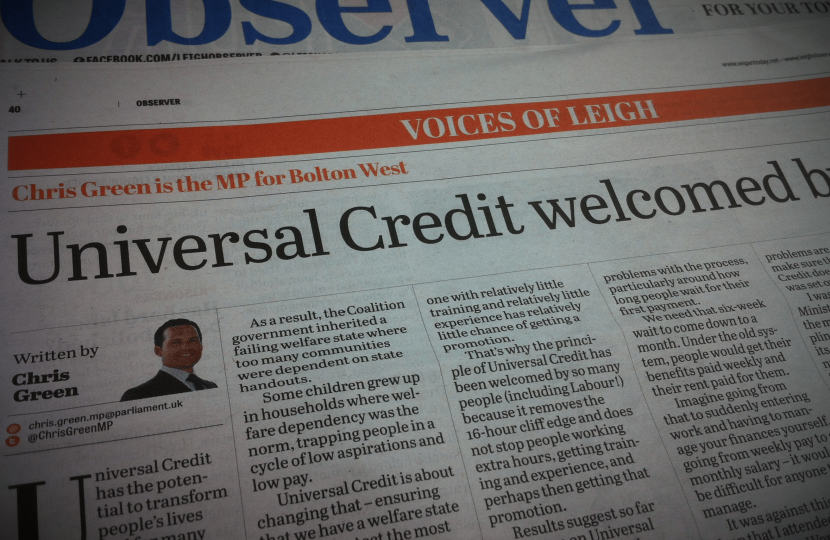
Universal Credit has the potential to transform people’s lives and for many people it has done. This new benefit, which updates the old complicated system by merging six payments from three different organisations into one, is aimed at preparing people for the world of work and ensuring that having a job always pays.
Under the last Labour government, I think we all knew someone who could have worked but instead lived off benefits – often because the system forced people to be dependent upon them. As a result, the Coalition government inherited a failing welfare state where too many communities were dependent on state handouts. Some children grew up in households where welfare dependency was the norm, trapping people in a cycle of low aspirations and low pay. Universal Credit is about changing that – ensuring that we have a welfare state that will protect the most vulnerable in our society, but also making sure that those who can work do so.
Under the current system, if people work 16 hours, they don’t have the incentive to work additional hours because of the way the system works. How much money would an employer want to spend on training a person who only works 16 hours a week? How much experience does that person get? Someone with relatively little training and relatively little experience has relatively little chance of getting a promotion. That’s why the principle of Universal Credit has been welcomed by so many people (including Labour!) because it removes the 16 hour cliff edge and does not stop people working extra hours, getting training and experience, and perhaps then getting that promotion.
Results suggest so far that those on Universal Credit are more likely to find work within six months, work more hours and earn more than if they were on the old benefits system. We think that Universal Credit will help around 250,000 more people into work – a massive number of people if you think about how much the unemployment has fallen since 2010.
But there are clearly problems with the process, particularly around how long people wait for their first payment. We need that six week wait to come down to a month. Under the old system, people would get their benefits paid weekly and their rent paid for them. Imagine going from that to suddenly entering work and having to manage your finances yourself, going from weekly pay to a monthly salary – it would be difficult for anyone to manage.
It was against this backdrop that I attended my first session of the Work and Pensions Select Committee last week.
During the meeting, I challenged the Work and Pensions Secretary of State David Gauke on these problems (if you want to watch the exchange, there’s a video on my Facebook page). I argued that we need a firebreak whilst some of the problems are sorted out to make sure that Universal Credit does exactly what it was set out to do. I was pleased that the Minister confirmed during the meeting that the helpline that Universal Credits use will be a freephone number and I am hopeful that he will listen to our other recommendations.
If anyone in Atherton has had any experiences with Universal Credit and would like to let me know their views on it, I would be very interested to hear them. You can email me directly at [email protected] or message me on Facebook.
The other week, I was invited to officially open a brand new rehabilitation facility in Atherton. The Spinney have opened the Coppice, a new bedded facility for male patients. The Spinney has been rated outstanding by the CQC and does a fantastic job in helping some of the most vulnerable people in our community. I was really pleased to find out more about the very good work they do and see their state of the art facilities.
Along with the new £40 million psychiatric hospital on Atherleigh Way which provides services for adults suffering mental ill health as well as patients with dementia and memory conditions, we are showing that looking after people at the most vulnerable point in their lives is a priority for this government. Any one of us could be affected by mental health in our lives and we are now seeing some of this investment here locally.

